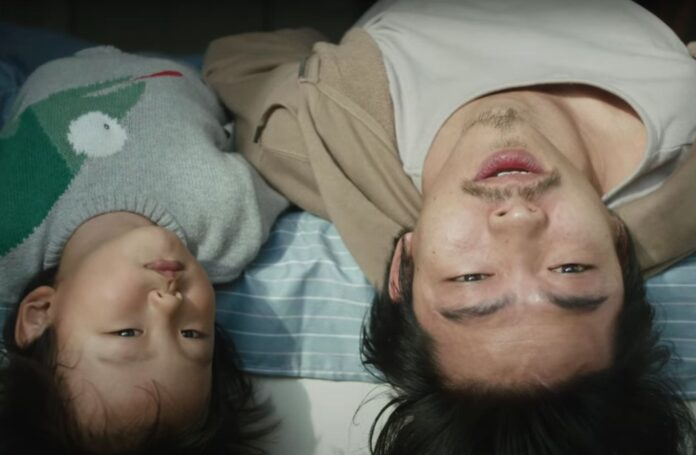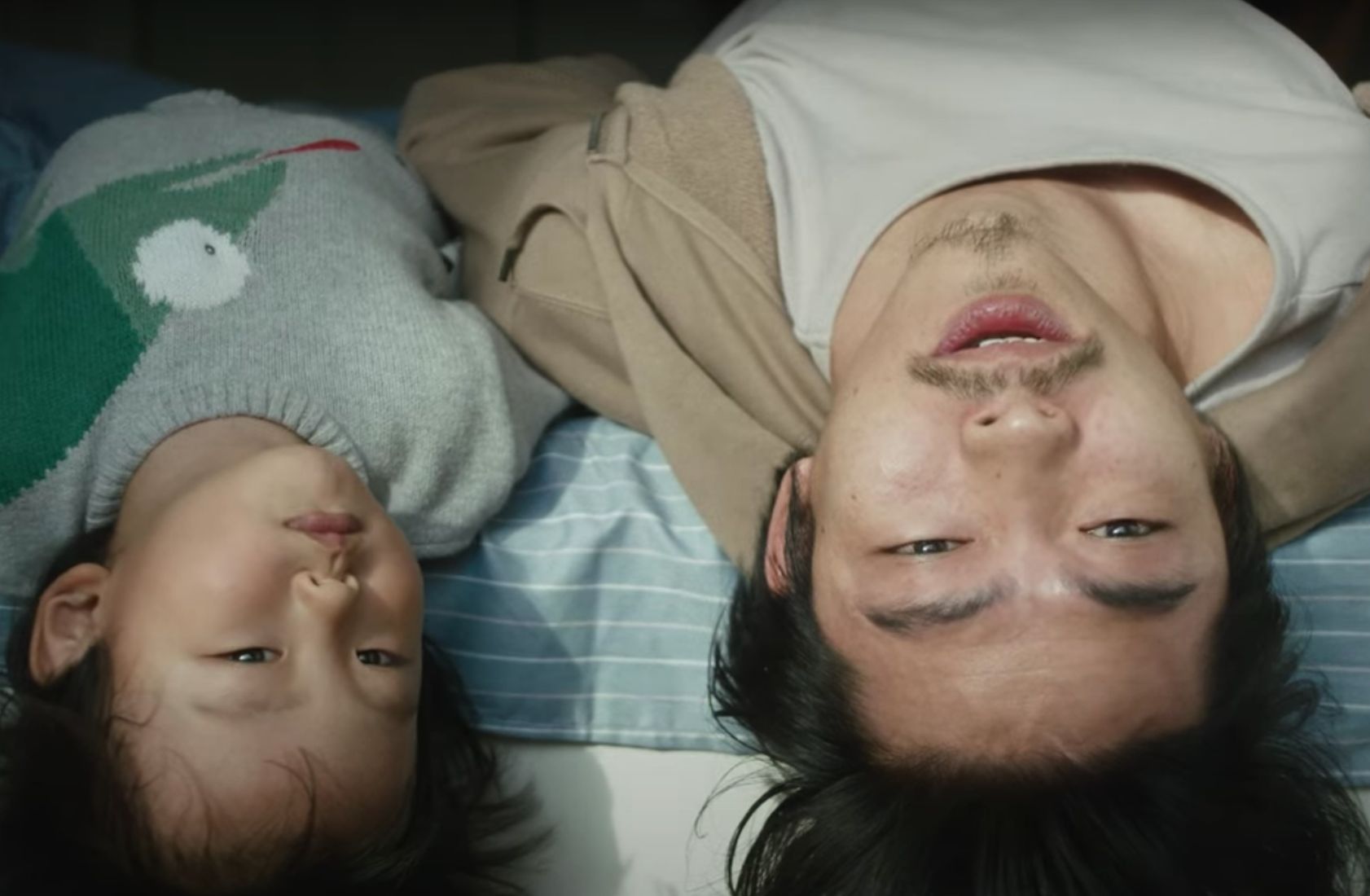Though movie and TV production seems to be kinda-sorta back to “normal” (allowing for heightened COVID safety measures), there were quite a few months there when it all slowed to a trickle. Not quite a full stop, however, because some creatives found ways to work around, or with, the shutdown. These ranged from the ingenious (like sleeper horror hit Host, which took place during a fictitious Zoom-type video conference call) to the excruciating (my personal worst being a watching-paint-dry documentary about gay porn stars discussing their lockdown boredom for two hours), with a lot of uninspired, gimmicky stuff in between. No doubt these projects will continue to be released for many months to come—let’s just hope it doesn’t turn out to be “years.”
From the vantage of international arthouse cinema, surely one of the more intriguing such make-work enterprises is The Year of the Everlasting Storm, which opens at the Embarcadero and other theaters this Fri/3. It’s an omnibus feature in which seven directors from around the world were given free rein to make a short within the considerable logistical confines of last year’s initial home quarantining.
As with any such catch-all package, the results are variable. But they do provide an interestingly rangy snapshot of a particular shared (albeit not physically) moment in time. Oft-banned Iranian director Jafar Panahi contributes a humorous, diaristic entry with “starring” roles for both his 90-year-old mother and pet iguana. Likewise working in a nonfiction mode is US documentarian Laura Poitras (Citizenfour), who again tackles a loaded topic of governmental overreach—in this case covert multinational deployment of an Israeli company’s cyberweapons, whose use has been directly tied to the harassment (even assassination) of journalists and dissidents.
There are mini-dramas of stressful sheltering-in-place from Anthony Chen (portraying a mainland Chinese family unraveling in isolation), Dominga Sotomayor (a woman and her daughter cocooned outside Santiago, Chile), and The Green Knight’s David Lowery (following a character’s solo road trip to uncover a child’s long-hidden grave). Los Angelean Malik Vitthal mixes animation, verite and other elements in his piece, while Thai master Apichatpong Weerasethakul’s closing bit is pure poetical abstract. Despite the title, none of Everlasting Storm’s segments provide much fire or fury; they’re all imbued to some degree with the eerily low-key tenor of enforced quietude. This may not be the most entertaining movie of late, but it’s definitely one that will prove worthy of time-capsule inclusion.
Isolation and solo distress happen to be a running theme in several other new releases this weekend:
Odd Man Out: Two Indigenous Stories
A pair of bleak but interesting debut narrative features provide harsh illustrations of native men fitting into—or being rejected from—mainstream society. Lyle Mitchell Corbine Jr.’s Wild Indian starts in the 1980s, with two Ojibwe boys attending a Catholic school while dealing with variably dysfunctional home lives. When the one in the far-worse domestic situation acts out—senselessly, horrifically—the other helps cover that misdeed up. Yet decades later, it turns out time and circumstance have dealt out “justice” in grotesquely unfair, unequal fashion, leading one now-adult protagonist (Chaske Spencer) to seek revenge on another (Michael Greyeyes).
Set largely in Wisconsin but shot in Oklahoma, Wild Indian is straightforward and unforgiving as a Great Plains landscape, more a sober drama than a payback thriller. It’s a compelling, well-acted story, if a hard one to take: Corbine not only gives us a central character who is a cold-blooded sociopath, but dares to deny us the usual comeuppance we expect for the guilty. Here, assimilation can indeed be its own reward—even if it’s a lie the beneficiary is well aware of—and no good deed among the less-fortunate goes unpunished.
In Joao Paulo Miranda Maria’s contrastingly stylized, fantasy-tinged Memory House, “progress” is even more bluntly cruel to sixty-ish indigenous man Cristovam (Antonio Pitanga). When a European company takes over the dairy company he’d been laboring for, his rural farm is rendered irrelevant. They do him the “favor” of providing a replacement factory job. But he’s as scorned by the other workers as he seems incongruous in the blinding antiseptic white of their workplace. He is constantly humiliated and abused, not always earning our full sympathy with responses bred by his own bigoted ignorance.
For lack of anywhere else to go, Cristovam gravitates towards an abandoned house whose contents encompass tokens of his ancestral past, and the spirituality otherwise so lacking in this place. Even there, however, he’s not safe from persecution. Increasingly grotesque, Memory House is a visually arresting if simple parable with little need for dialogue. Like the bull he eventually imagines himself as, our hapless hero has had his future auctioned off—and it leads straight to the abattoir. Though not quite so flamboyant, this is a Spanish-language surrealist tragedy of modern-day colonialism one can imagine Jodorowsky and Fernando Arrabal (both still with us in their nineties, by the way) grokking. On Fri/3, Wild Indian is getting released to limited theaters and VOD, Memory House to physical and virtual theaters (more info here).
Mogul Mowgli
I wasn’t as taken as some critics by the whole of Sound of Metal two years ago, but like everybody else was knocked out by Riz Ahmed’s lead performance as a heavy metal drummer suffering sudden, catastrophic hearing loss. Apparently that experience (which duly won him an Oscar nomination, among other laurels) was very good for the Rogue One and Venom actor, too, because he’s gone and made another movie that’s waaay too much like Sound of Metal.
Here, he is Zaheer aka Zed, a British-Pakistani rapper on the verge of major success after a long hard climb. But while paying a belated visit to family in London, he has an unpleasant interaction that triggers motor-function problems eventually diagnosed as a chronic degenerative condition without cure. Zed has an understandably very hard time accepting that his career has stalled, perhaps for keeps. But that’s all that happens for Mogul Mowgli’s hour and a half—he emotes his frustration, falls down a lot, hallucinates a bit, and remembers past performances.
Ahmed really is a rapper (he’s released well-received records both solo and as a member of Swet Shop Boys), so it’s quite compelling to hear him spit out tight, mercifully-subtitled rhymes on political and cultural-identity themes. But charismatic as he is on- and off-stage here, the screenplay Ahmed has cooked up (well, undercooked) with director Bassam Tariq provides very little in the way of developed supporting characters, relationships, or articulation of the sociopolitical themes it just hints at. The result is the kind of nearly-one-man-show that’s so flimsy beyond providing a star setting, it can hardly help but seem something of a vanity-project indulgence. Mogul Mowgli opens this Fri/3 at the Embarcadero, Shattuck, Rafael and other area theaters.
Moments Like These Never Last
Likewise striking a rebellious posture for art’s sake— though one suspects he, too, could hardly do otherwise—is the late, short-lived subject of Cheryl Dunn’s documentary. Dash Snow was born into a family of NYC socialite (and further back, European aristocratic) privilege. Yet strife at home got him packed off to an expensive version of juvenile lockup by his early teens. He ran away to live with other young taggers and skateboarders in the South Bronx, his artistic leanings expressing themselves via Polaroids and other media that soon attracted attention—including from that perpetual creepy enthusiast for underage talent, Larry Clark, who is interviewed here.
After 9/11 his art became more politicized, as well as legitimized by the gallery and museum establishment—despite, or perhaps because of, its “edginess.” (Semen was one of his preferred art-making materials.) As is duly noted, “Collectors do like the idea of bad boy artists.” With his Axl Rose-type style and natural charisma, Snow was a photogenic example of that species. Was he really gifted, or just ready-made for the kind of hype he both benefitted from and eventually resented?
Hard to know, since he fatally OD’d in 2009 at age 27, and because Moments leaves so many questions unaddressed. It doesn’t let any disinterested parties analyze his work, and his simultaneously extroverted/self-destructive personality remains an enigma, as (perhaps for reasons of legal liability) details of his childhood and death alike are sidestepped here. Still, the film is a dynamic assemblage of preexisting video and other images that considerably boosts his posthumous mythology, even if deeper insight is lacking. The film is available On Demand as of Fri/3 from AppleTV and other platforms.
We Need to Do Something
All the above protagonists above, fictive and otherwise, feel trapped, albeit none quite so literally as the nuclear unit experiencing meltdown in Sean King O’Grady’s film. Shot during the pandemic, it’s a psychological horror in which a suburban family shelters in a bathroom during a severe, tornado-warning storm. An apparent fallen tree blocks their only way out, and while the tempest passes, no one seems to be coming to their rescue—not after one day, or another. Is this really the result of a natural disaster, or is something distinctly unnatural going on? Flashbacks to teen Mel’s (Sierra McCormick) relationship with a witchy classmate (Lisette Alexis) suggest an occult answer.
But Max Booth’s screenplay (based on his same-titled novella) refuses to spell anything out, even as it piles on some ickiness involving rattlesnakes, alternatives to starvation, and so forth. No Exit this ain’t, making the lack of explication irritating—though not as irritating as the characters we’re stuck with for 97 minutes. They’re at each other’s throats before the crisis has really even begun, with uncomfortable, baiting dynamics between Mel and little brother Bobby (John James Cronin), Mel and Dad (Pat Healy), and Dad and Mom (Vinessa Shaw). In fact, vindictive, tantrum-throwing dad is such a dick, you may spend much of We Need hoping a tree or poisonous snake or demon or whatever will fall exclusively on him.
This IFC Midnight theatrical release, shot during the pandemic, is well-made as far as it goes. But the sum effect is much less big on suspense or mystery than it is on the exasperation of being stranded with people who can’t handle an emergency well, or even just stop yelling at each other for 30 seconds.






